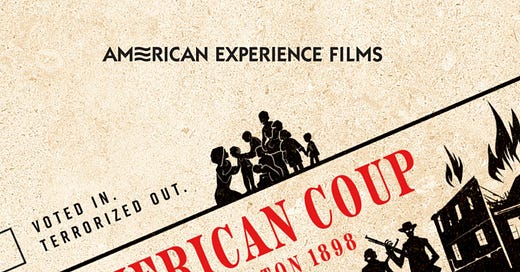I started drafting my newsletter article for this week on Juneteenth, a day when we remember the delayed freedom of enslaved people in Texas, two and a half years after the Emancipation Proclamation. Juneteenth reminds us that justice is rarely handed down freely; but more often it must be fought for and demanded, especially when systems of power resist giving it. It’s a holiday that calls us to celebrate freedom while also reckoning with the painful truths of our country’s history, truths that have often been censored or silenced.
This Sunday, June 22, Holy Covenant UCC will be hosting a screening of the PBS documentary American Coup: Wilmington 1898. If you haven’t heard of the Wilmington massacre, you’re not alone. It’s the only successful coup in U.S. history, where a violent overthrow of a democratically elected, multiracial government by white supremacists in North Carolina occurred. It’s a story of American history that’s been buried and rarely discussed for over a century. And it is a story that feels especially urgent today.
We are living in a time when we’re seeing democracy undermined. Not by secret plots, but often in plain sight. Just last week, U.S. Senator Alex Padilla was forcibly removed by federal officers while trying to do the job he was elected to do.
As the subcommittee chair of the Senate Judiciary that offers oversight on immigration reform proposals, as well as oversight of federal agencies with citizenship, asylum, refugee, and immigration enforcement responsibilities, Padilla had come to the press conference being led by Homeland Security to receive updates on immigration enforcement efforts in California.
Padilla came to listen until the political rhetoric on immigration enforcement got to be too much. And when the Senator stood up and started to ask questions, which he was elected to do, he was forcefully pushed to his knees, restrained, and removed from the press conference.
As historian Dr. Heather Cox Richardson noted in a YouTube video last week, the echoes of what happened in Wilmington, North Carolina over a hundred years ago are still with us. We are seeing it right now in the suppression of truth, the silencing of dissent, and the use of force to undermine rights and democracy.
So why are we as a faith community wanting to show this film?
Well, Jesus lived and taught in a world shaped by imperial violence, religious collusion that intertwined political power, and deep divisions among people. He knew what it meant to speak truth in dangerous times. He publicly challenged the political and religious powers of his day, not with weapons, but with stories that exposed injustice, with healings that restored dignity to the marginalized, and with questions that unsettled the powerful.
He wept over the violence of empire he witnessed crushing his people, and in its wake, he sought to pronounce blessings to the poor, the meek, and the hungry.
Jesus also taught that truth is not something we bury or stay silent about to keep the peace, it’s something we uncover to set one another free. When he declared in the synagogue that he had come to “bring good news to the poor” and “proclaim release to the captives,” [Luke 4:14-22 (CEB)] it was not wishful thinking, it was his God-given mission. That same mission is calling to us now. Especially right now, as power is being abused, truth is being suppressed, and our neighbors are being harmed. We are called not to remain silent, but these are the times when we are being called to follow Jesus.
James Baldwin once wrote, “Not everything that is faced can be changed. But nothing can be changed until it is faced.” That’s the invitation of this documentary: to face a difficult truth that lies in our past, and to allow that truth to change us. This documentary offers us more than a history lesson but asks us whether we are willing to face the truth of our past with the same courage Christ called for his followers to have as they live out his ways in the present.
The late Walter Brueggemann passed away just a few weeks ago, yet his words ring true from the grave, reminding us that “the prophetic tasks of the church are to tell the truth in a society that lives in illusion, to grieve in a society that practices denial, and to express hope in a society that lives in despair.” I can think of no better way to live into that prophetic calling than to gather this Sunday to learn, reflect, and recommit ourselves to the prophetic work of justice. The work of Jesus.
Following the screening, we’ll hold a panel discussion led by local historian Dr. Tom Hanchett and therapist and activist Justin Perry. The event runs from 1:00 to 3:00 p.m., but catered refreshments will be available starting at 12:15 p.m. To help us plan, we are asking folks to please RSVP via the link on our website or by calling the church office. Come early, bring a friend, and join us to discuss why telling the truth, then and now, remains sacred work.
Peace and Blessings,
Rev. Christopher Czarnecki
Thanks for reading Rev. Christopher Czarnecki’s Substack! Subscribe to receive new posts and support my work. Rev. Christopher Czarnecki serves as Senior Pastor of Holy Covenant United Church of Christ (UCC) in Charlotte, NC. To learn more about Pastor Chris and Holy Covenant UCC, you can visit us at our website, on Facebook, or Instagram.



